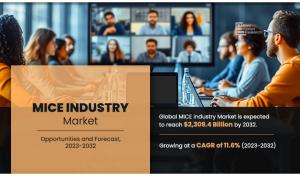MICE Industry Estimated to Surpass $2 Trillion by 2032, with a CAGR of 11.6%
The global MICE industry was valued at $598.2 billion in 2022, is estimated to reach $2,309.4 billion by 2032, registering a CAGR of 11.6% from 2023 to 2032.
Request Sample Copy of Report: https://www.alliedmarketresearch.com/request-sample/2433
Social media is very influential on society in both positive and negative ways. Social media connects people and also helps to communicate between consumers and businesses. It gives businesses a way to engage with customers. Before social media marketing, finding a targeted group of consumers was a difficult task for businesses and this took more effort also it is more costly, making it very difficult for startups to get in front of their target audience. Businesses are promoting their brands and products through social media. Through the advertisements & promotions of brands or products by celebrities, these brands can increase awareness and trust in their product. Consumers feel more comfortable with a brand if their services are promoted by a celebrity they admire or relate to. An increase in the penetration of social media for advertisement is expected to fuel MICE industry growth in the upcoming years.
The hotel and transportation industries are directly involved in the MICE industry. These industries may benefit from MICE business by offering their services and facilities to the planner and attendees of MICE events. Hotels are the main suppliers of MICE and are the main beneficiaries as well. According to top CXOs across the globe, business travelers who attend MICE events spend over 65% of their money on hotels for rooms and hotel dining while 15% is spent on other restaurants outside the hotel.
Around 10% is spent on shopping and another 10% on local transportation. In addition, the high penetration of the internet & technology in densely populated countries supports the growth of business travel, which indirectly supports the growth of the global MICE industry. Therefore, development in the MICE industry majorly drives economic growth, regional cooperation, and intellectual development.
Event organizers are now focusing on creating immersive and experiential events. This involves incorporating interactive technologies, unique venues, and engaging activities to make events more memorable and impactful. Event organizers are now collaborating more with other industry players such as suppliers, venues, and sponsors to create successful events with the increasing complexity of events. The increases in investment in meetings, exhibitions, and others is expected to propel MICE Industry demand in the upcoming years.
According to the market analysis, the MICE industry is segmented into event type, and region. On the basis of event type, the market is divided into meetings, incentives, conventions, and exhibitions. Region-wise, the market is analyzed across North America (the U.S., Canada, and Mexico), Europe (Germany, UK, Spain, France, Italy, and Rest of Europe), Asia-Pacific (China, India, Singapore, Thailand, Indonesia, Australia, New Zealand, Japan, Malaysia, South Korea, Vietnam, Hong Kong, Taiwan, and Rest of Asia-Pacific), Latin America (Brazil and Rest of Latin America), Middle East (UAE and Rest Of Middle East), and Africa (South Africa, Nigeria, Ghana, Kenya, Namibia, Rwanda, and Rest Of Africa).
Based on event type, the meetings segment held the major MICE industry share, in terms of revenue, in 2021. Hybrid events that combine both in-person and virtual attendance have become popular with the increasing use of technology and the COVID-19 pandemic. This allows organizers to reach a wider audience and make events more accessible to people who are unable to attend in person.
LIMITED-TIME OFFER - Buy Now & Get Exclusive Discount on this Report: https://www.alliedmarketresearch.com/checkout-final/b18c1fa4fbb805dbb4c9a019c8b93670
Region-wise, Europe was the largest market in 2021 and had the highest market share of 41.2%. Companies operating in the Europe MICE industry are offering innovative services to sustain in the competitive market. Germany is one of the leading markets for business travel in the Western European region. Overall economic development has led to the strengthening of the German MICE industry. Large companies are major consumers of the MICE industry; however, the consumption rate of SMEs is growing rapidly. The domestic market for the MICE industry is highly consumed by the SME segment.
Some of the key players profiled in the MICE industry analysis include Maritz, BI Worldwide, Ltd., ITA Group, Inc, One10, LLC, Meetings and Incentives Worldwide, Inc. (M&IW), Creative Group, Inc., ACCESS Destination Service, 360 Destination Group, CSI DMC, Carlson Wagonlit Travel, IBTM, BCD Group, Cievents, ATPI Ltd, Conference Care Ltd, the Freeman Company, and the Interpublic Group of Companies, Inc.
Hi-Speed Announces Significant Growth in Motor Shop Capabilities with New Electrical Test Panel
Let Her Sing® 2025 Carries On: Diaspora Arts Connection Moves Forward Despite Travel Ban Setback
Japan’s Diabetes Digital Therapeutics Market to Reach USD 136.4 Mn by 2033 with Strong Adoption | DataM Intelligence
Więcej ważnych informacji
 Jedynka Newserii
Jedynka Newserii

 Jedynka Newserii
Jedynka Newserii

Ochrona środowiska

A. Bryłka (Konfederacja): Ograniczenie emisyjności nie musi się odbywać za pomocą celów klimatycznych. Są absurdalne, nierealne i niszczące europejską gospodarkę
W lipcu br. Komisja Europejska ogłosiła propozycję nowego celu klimatycznego, który zakłada ograniczenie emisji gazów cieplarnianych o 90 proc. do 2040 roku w porównaniu do stanu z 1990 roku. Został on zaproponowany bez zgody państw członkowskich, w przeciwieństwie do poprzednich celów na 2030 i 2050 rok. Polscy europarlamentarzyści uważają ochronę środowiska i zmiany w jej zakresie za potrzebne, jednak nie powinny się odbywać za pomocą nieosiągalnych celów klimatycznych.
Polityka
Dramatyczna sytuacja ludności w Strefie Gazy. Pilnie potrzebna dobrze zorganizowana pomoc humanitarna

Według danych organizacji Nutrition Cluster w Strefie Gazy w lipcu br. u prawie 12 tys. dzieci poniżej piątego roku życia stwierdzono ostre niedożywienie. To najwyższa miesięczna liczba odnotowana do tej pory. Mimo zniesienia całkowitej blokady Strefy Gazy sytuacja w dalszym ciągu jest dramatyczna, a z każdym dniem się pogarsza. Przedstawiciele Polskiej Akcji Humanitarnej uważają, że potrzebna jest natychmiastowa pomoc, która musi być dostosowana do aktualnych potrzeb poszkodowanych i wsparta przez stronę izraelską.
Polityka
Wśród Polaków rośnie zainteresowanie produktami emerytalnymi. Coraz chętniej wpłacają oszczędności na konta IKE i IKZE

Wzrosła liczba osób, które oszczędzają na cele emerytalne, jak również wartość zgromadzonych środków. Liczba uczestników systemu emerytalnego wyniosła w 2024 roku ponad 20,8 mln osób, a wartość aktywów – 307,5 mld zł – wynika z najnowszych danych Urzędu Komisji Nadzoru Finansowego (UKNF). Wyraźny wzrost odnotowano w przypadku rachunków IKE i IKZE, na których korzyść działają m.in. zachęty podatkowe. Wpłacane na nie oszczędności są inwestowane, a tym samym wspierają gospodarkę i mogą przynosić atrakcyjną stopę zwrotu.
Partner serwisu
Szkolenia

Akademia Newserii
Akademia Newserii to projekt, w ramach którego najlepsi polscy dziennikarze biznesowi, giełdowi oraz lifestylowi, a także szkoleniowcy z wieloletnim doświadczeniem dzielą się swoją wiedzą nt. pracy z mediami.








.gif)

 |
| |
| |
|